This website uses cookies so that we can provide you with the best user experience possible. Cookie information is stored in your browser and performs functions such as recognising you when you return to our website and helping our team to understand which sections of the website you find most interesting and useful.

The Weather in Vietnam
The weather in Vietnam can greatly differ from the north, central belt and south of the country. Each of these regions experiences different weather at various times of the year since Vietnam is located in the tropic and subtropic regions. The most important thing to remember is the weather and temperatures will change a lot if travelling the length of the country. This can be a big factor when deciding the best time to visit Vietnam and which direction you travel in.
The north of Vietnam is cooler, with winter generally lasting from November to January with frost and snow a possibility in the mountains. Tourist destinations such as Hanoi and Halong Bay will enjoy milder temperatures however layers will still be essential.
Coastal Vietnam has warmer weather from July to October and cooler weather from November to May. Typhoons can affect the coast in the summer months from July to November.
We travelled to Vietnam with G Adventures.
When should I go to Vietnam?
Overall Vietnam is a fantastic destination year round, with no “perfect” time to visit. For the driest and warmest experience, the best time to visit Vietnam is Spring (February to April) and Autumn (September to December). Ultimately, if you can it is advisable to avoid Typhoon season where unexpected weather can shut down roads and cause delays. These tropical storms generally affect the central region from May to June and move further south from September to November. If you are travelling the length of the country, chances are you will experience varying whether, so pack the flip flops and the anorak and embrace it!
Check out Viator for great cruises around Halong Bay.
Touradar lets you compare many tour operators so you can find the best deals for your vacation in Vietnam.
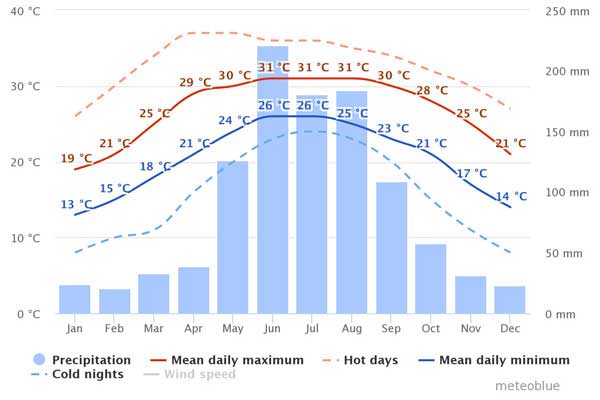
Festivals and Public Holidays
The Vietnamese people enjoy various holidays and festivals throughout the year.
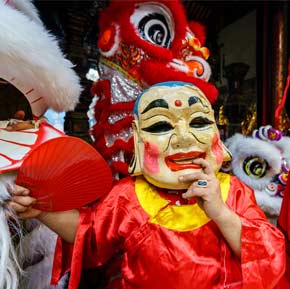
Tết
(Vietnamese Lunar New Year) is by far the most popular holiday celebrated in Vietnamese culture. The word comes from “Tết Nguyên Đán” which translates to “Feast of the first morning of the first day” – in other words it represents the first day of the first month of the Vietnamese calendar which is usually also the same day as Chinese New Year. It usually lands at the end of January or early February each year. Family get togethers, paying respect to ancestors and visiting temples are the key elements of Tết, and almost all shops and restaurants will shut down.
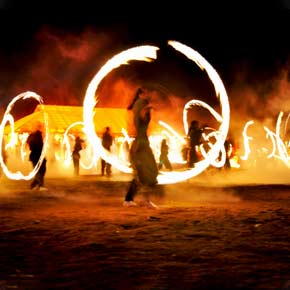
Hue Festival
Hue Festival is held every two years in the UNESCO listed city of Hue. The festival practises traditional customs and hosts cultural events, games and performances over the course of a week. It usually takes place in April, May or June and takes over various venues all over the city. Unique events include the Poetry Festival, fashions shows and percussion shows. Since Hue held the title of capital city of Vietnam during the 19th century, locals also put on performances re-enacting royal ceremonies.
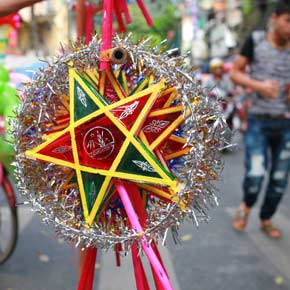
The Mid-Autumn Festival
The Mid-Autumn Festival is another very important spectacle for the Vietnamese people. Held on the 14th of the 8th month of the lunar calendar, usually with a full moon at night. Also known as the Harvest Festival, it features performances, lantern processions and cultural exhibitions throughout the country. The festival incorporates the most important factors for the people; gathering of families, giving thanks for the harvest and prayer. Food stalls line the streets selling sticky rice, fruit and mooncakes, which is a pastry usually filled with sweet bean paste and is traditional to the festival.
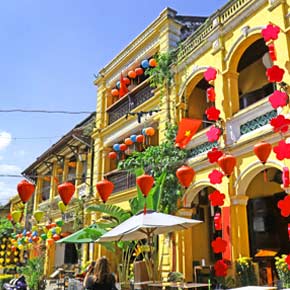
Hoi An Lantern Festival
The Hoi An Lantern Festival is one of the most beautiful and colourful festivals in the country. Held on the 14th day of each lunar month, every business in Hoi An switches off all electricity and instead use hundreds of lanterns and candles. Lanterns are also laid to float down the river as an offering of worship.
Touradar lets you compare many tour operators so you can find the best deals for your vacation in Vietnam.
Other public holidays in Vietnam are:
Feb 3rd
Founding day of the Communist Party
April 30th:
Liberation Day of the South of Vietnam. Also known as Reunification Day or Victory Day, it marks the capture of Saigon by the Viet Cong and the end of the war, which later resulted in the Republic of Vietnam.
May 1st
Labour Day. This is celebrated as international labour day and is tied together with Liberation Day, offering the people an extended holiday.
May 19th
Ho Chi Minh’s Birthday
May 28th
Holiday to commemorate the birth and death of Buddha
Sep 2nd
National Holiday. This day celebrates President Ho Chi Minh’s declaration of independence in Hanoi on 2nd September, 1945.
Sep 3rd
Commemorates the death of Ho Chi Minh
We are passionate adventure travelers who want to share the world and our travel experiences with everyone…
